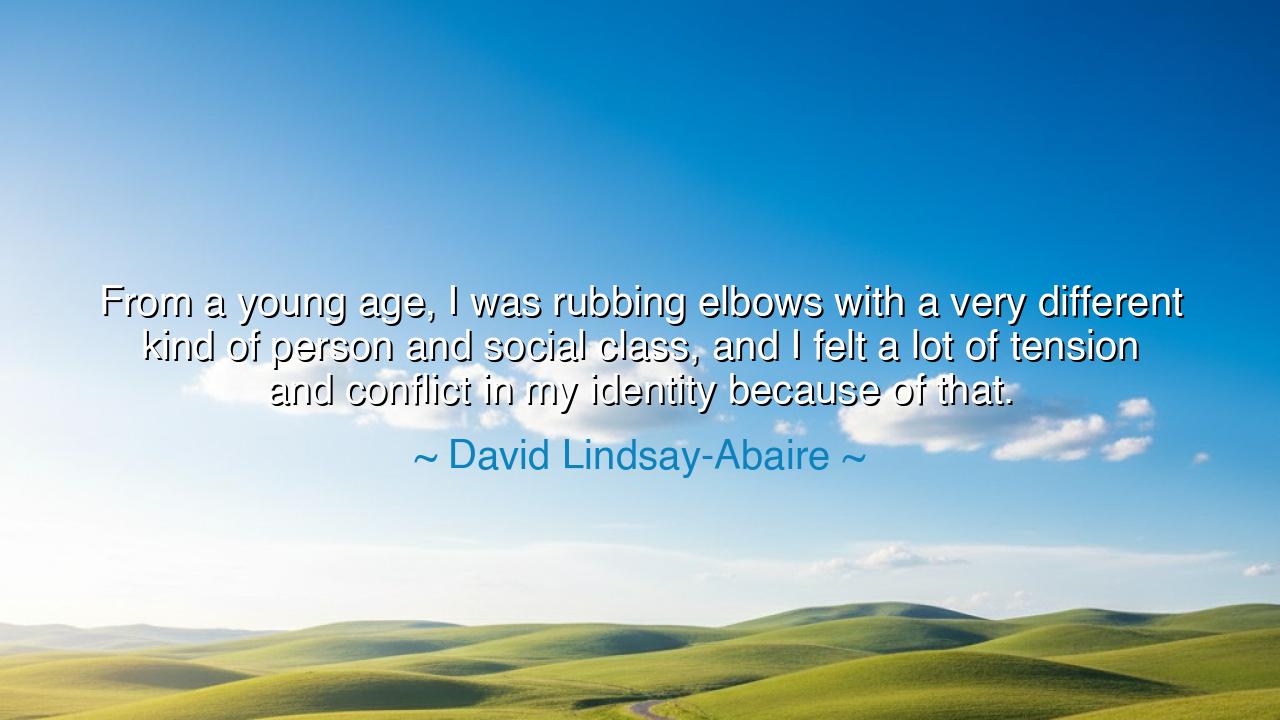
From a young age, I was rubbing elbows with a very different kind
From a young age, I was rubbing elbows with a very different kind of person and social class, and I felt a lot of tension and conflict in my identity because of that.






"From a young age, I was rubbing elbows with a very different kind of person and social class, and I felt a lot of tension and conflict in my identity because of that." These words, spoken by David Lindsay-Abaire, shed light on a universal struggle that has echoed throughout history: the conflict between identity and the forces that shape it. To be born into one world while finding oneself in another, to navigate between different social classes and expectations, is a journey fraught with tension and inner discord. It is the journey of realizing that the world around us does not always fit the mold of our innate sense of self. The tension Lindsay-Abaire speaks of is the fracture between the inner world and the outer world, between who we are and who the world wants us to be.
In ancient times, this struggle was not unknown. The Greek hero Heracles (known to us as Hercules) was born to Alcmene, a mortal woman, and Zeus, the king of the gods. From an early age, Heracles was thrust between the divine and the mortal, living in two worlds, neither of which fully accepted him. His strength, while a gift, was also a curse—he never fully belonged to either realm. In his struggles, he embodied the tension Lindsay-Abaire describes: being bound by his divine heritage while trying to reconcile his humanity. The conflict between his identity as a man and as a son of Zeus led him to both great feats and tragic flaws, as he was never quite able to find peace between the two.
Lindsay-Abaire's words also bring to mind the story of Plato, the great philosopher who wrestled with his own identity in the context of ancient Athenian society. Plato was born into a family of aristocrats, but he was also deeply influenced by the teachings of his teacher Socrates, who was a poor man of the people. Plato's life was a continual struggle between the privileged world he was born into and the philosophical ideals he believed in. His work sought to harmonize the tension between social status and personal integrity, ultimately developing the idea of the philosopher-king who would rule with wisdom, not wealth or class. In this tension, Plato—like Lindsay-Abaire—sought a deeper understanding of self, of how one’s true identity could be nurtured amidst external pressures.
The tension Lindsay-Abaire refers to can also be seen in the life of Frederick Douglass, the great abolitionist and former slave. Douglass was born into slavery, a position that defined his early identity. Yet, through his own determination, he transcended the boundaries imposed upon him by society and gained freedom. However, his struggles did not end there. As a free man, Douglass had to navigate the tension between his past as a slave and his present as an advocate for freedom and equality. He was constantly forced to define himself in ways that did not fit the narrow categories imposed by society. His life was one of conflict, of grappling with who he was, who he was expected to be, and who he chose to become.
This conflict of identity, then, is not just a personal matter, but a societal one. It is the struggle of living in a world that attempts to define us, to place us in neat categories, without acknowledging the complexity of our individual experience. Lindsay-Abaire’s words are a call to understand that identity is not something that is simply handed to us; it is something we must forge in the face of opposition and expectation. It is the courage to hold onto who we are, to be true to our inner self, even when the world around us wants to mold us into something else. In this sense, identity is not just personal; it is also political, social, and deeply tied to the structures of power that define the world we live in.
The lesson here is clear: the struggle with identity is not a solitary battle. It is a universal human experience, one that spans time and culture. It is a reminder that tension—the clash between who we are and who we are told to be—often drives us to growth and self-discovery. The conflicts we experience, whether in our social class, our family, or our community, are not meant to break us, but to shape us into something greater. Just as Heracles’ journey was one of overcoming external expectations, so too must we rise above the confines imposed on us by others.
In practical terms, this means recognizing the tension within ourselves and the world, and not shying away from it. When we feel misunderstood or misplaced, we must see it as an opportunity for growth. Like Plato, Douglass, and Lindsay-Abaire, we must continue to seek a path that allows us to live authentically, despite the external pressures. The journey of self-discovery is a heroic one, and it requires the strength to remain true to oneself, even when the world demands conformity.
So, let us follow in the footsteps of those who have come before us, knowing that the struggles of identity are not burdens to bear alone, but part of the human condition. Let us embrace the tension, and in doing so, become more fully ourselves, more fully free. Just as Heracles found strength in his dual nature, and Douglass found purpose in his struggle, we too can find the power to define our own identities—strengthened by the very challenges that threaten to divide us.






AAdministratorAdministrator
Welcome, honored guests. Please leave a comment, we will respond soon